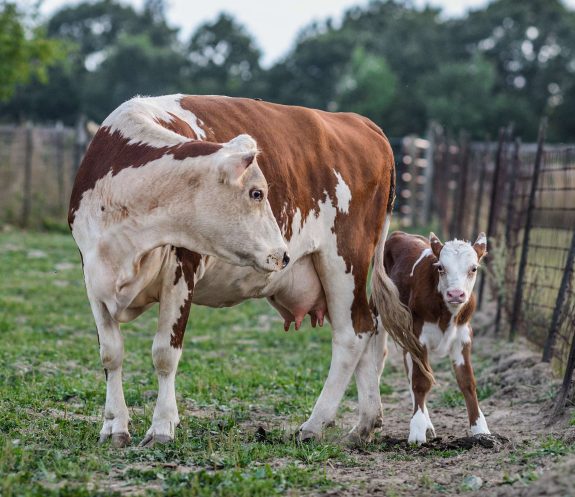On Mother’s Day, we celebrate the powerful bond between mothers and their children. But for mother cows, that bond is routinely broken. Like us (and all mammals), cows have to give birth in order to produce milk. In the dairy industry, it’s standard practice to separate calves from their mothers within the first few hours after birth. Why? So that the milk naturally intended for the calf can instead be harvested and sold to humans. This painful separation causes intense distress for both mother and baby. With approximately 962,400 dairy cows in Canada as of January 2025, this heartbreaking cycle affects countless animals every day.
Mother-Calf Bonds are Strong—But Broken Far Too Soon
Cows are inherently maternal animals. Like human mothers, cows form strong bonds with their babies; nuzzling, grooming, and staying close to protect and nurture them. But in the dairy industry, this bond is broken shortly after birth.
After they are snatched from their mothers, farmers commonly confine calves inside tiny plastic calf hutches, where they are raised in isolation with limited comfort or companionship. This early separation causes visible distress for both mother and calf. While the mother may call out or search for her baby, the calf is left to cope without the warmth, milk, or care of their mother. Boy calves may be raised for veal and killed young, and girl calves sometimes meet the same fate as their mothers—destined to become dairy cows themselves. Other times, the calves aren’t needed by the farmer so they are simply shot.
Shockingly, while this practice may be distressing, it’s not illegal in Canada. There are currently no federal laws prohibiting the early separation of calves from their mothers. Instead, the dairy industry is allowed to make up it’s own rules via the industry-dominated National Farm Animal Care Council (NFACC). The NFCAA dairy code offers unenforceable recommendations—but not laws—on animal care. Yet even these minimal guidelines are frequently ignored, with investigations revealing routine violations across Canadian dairy farms, including cows being beaten with canes, wrenches, and pitchforks; cows dragged through barns with heavy machinery; and limping and emaciated cows.
Rethinking Dairy This Mother’s Day
Mother’s Day is a time to reflect on care, nourishment, and the love shared between mothers and their children. But when it comes to the dairy products on our plates, those values are in direct conflict with how dairy is produced.
Beyond the emotional toll on mother cows and their calves, dairy farming raises serious ethical concerns. Most Canadian dairy farms still use tie stalls, where cows are kept tethered in small stalls and can stand up and lay down, but cannot turn around or otherwise exercise. Dairy milk cannot be produced without forcibly and repeatedly impregnating sensitive mother cows, exploiting their reproductive systems. And when their bodies give out after constant cycles of pregnancy and milking, they are shipped to slaughter in a weakened condition, and killed for hamburger meat; practices hidden behind marketing that paints dairy as wholesome and natural.
Health-wise, official government guidance has also moved away from promoting dairy as essential. The 2019 update to Canada’s Food Guide no longer lists dairy as a separate food group. Instead, milk, cheese, and yogurt fall under the larger umbrella of “protein foods,” and the guide now recommends choosing plant-based proteins more often. This change reflects growing evidence that diets rich in whole, plant-based foods are better for both personal health and the planet.
With so much information now available, many Canadians are rethinking dairy—not just for their health, but out of compassion for mother animals.
Celebrate with Dairy-Free Delights
Choosing dairy-free isn’t just a compassionate decision; it’s also a delicious one! This Mother’s Day, why not celebrate the moms in your life with a brunch that’s both crave-worthy and kind to animals, including mother cows?
From creamy oat milk lattes to buttery vegan croissants and rich cashew-based cheeses, plant-based alternatives have come a long way. Many are fortified with calcium and other key nutrients, and they often taste just as good (if not better!) than their dairy counterparts.
Canadian companies are leading the way with innovative, mouthwatering dairy-free options that make it easy to ditch dairy without sacrificing flavour. Whether you’re making pancakes, parfaits, or a cozy baked dish, there’s a plant-based swap for every recipe.
| Brand | Location | What They Make |
| Nuts for Cheese | London, ON | Cultured cashew-based cheeses |
| Earth’s Own | Burnaby, BC | Oat, almond, and soy milk |
| Millsie | Vancouver, BC | Vegan cheese spreads |
| Maison Riviera (Plant-Based Collection) | Sorel-Tracy, Quebec | Vegan yogurts and cheeses |
| Yoso | Cambridge, Ontario | Dairy-free yogurts and spreads |
| Oat & Mill | Ottawa, ON | Oat-based ice cream |
No matter what you serve, the most meaningful ingredient is compassion. Choosing dairy-free is a powerful way to honour the mother cows who have to endure so much—and to align your celebration with kindness.
Banner: Jo-Anne McArthur | We Animals




